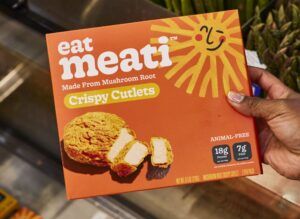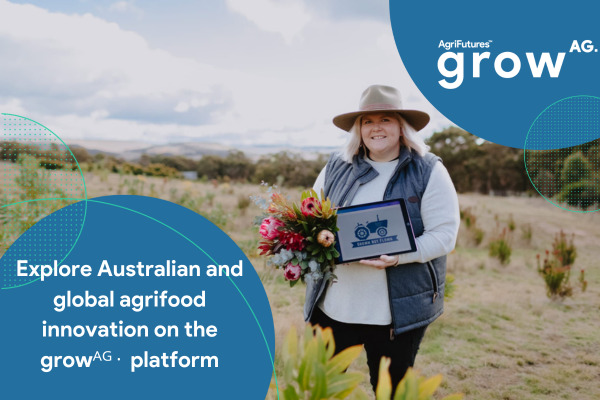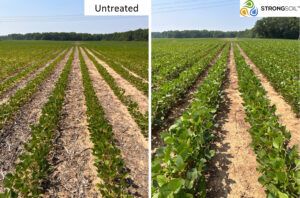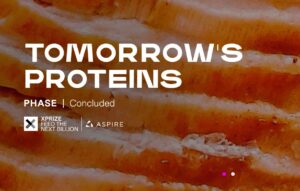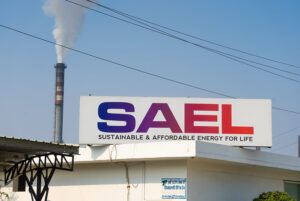Alt meat startup The Better Meat Co has slashed production costs for its fungi biomass fermentation technology by moving to a continuous process, such that “at scale, even with no further R&D advancements,” its mycoprotein is “projected to compete on cost with commodity beef.”
Many firms in the space run semi-continuous processes cofounder Paul Shapiro told AgFunderNews. However, a continuous process, in which feedstock is added and products are harvested continuously, “is a different animal altogether.”
He added: “You are harvesting every single second, which is the holy grail for fermentation because it opens up dramatically greater efficiencies. To our knowledge, nobody aside from Quorn is doing continuous biomass fermentation in the mycoprotein space.”
Sacramento-based The Better Meat Co started out by providing plant-based meat enhancers, which it still supplies to Perdue Farms for its ‘Chicken Plus’ hybrid meat/veggie range, but later switched its focus to fungi.
It has since run 100+ harvests from a 9,000-liter bioreactor producing ‘Rhiza’ mycoprotein, which can be used as “single ingredient alt-meat,” said Shapiro.
“The Better Meat Co has proven its ability to run in batch, semi-continuous, and continuous fermentation modes at our demo-scale plant. In the last year alone, our continuous R&D has enabled us to slash feedstock costs while producing a higher quantity of mycelium, enabling a total at-scale cost reduction of more than 30%.
“Combining this work with advancements in strain selection, breeding, and innovative fermentation methods, we can now produce 68% more mycelium in the same time and with lower total feedstock costs compared to one year ago.”

LOIs and offtake agreements for 33 tons dry mycoprotein/month (99 tons when hydrated)
The company “has numerous paid collaborations with our joint development partnerships,” said Shapiro. “We also sell Rhiza mycoprotein in NorCal restaurants in the form of steaks, carne asada, and foie gras.
“The Better Meat Co has multiple signed letters of intent and offtake agreements currently representing demand for 33 tons of dry mycoprotein per month—the equivalent of 99 tons when hydrated—from our joint development agreement partners.”
However, the startup—which has been embroiled in a lengthy legal dispute with fellow biomass fermentation startup Meati Foods over IP—is “unable to commercially supply major CPG brands until we scale up,” added Shapiro, who has raised $27 million to date but needs a further influx of capital to manufacture Rhiza at meaningful scale.
He added: “The agreements are from some of the biggest CPG brands on the planet in the US and in Asia.”
Asked how the company generates revenue at the moment, he said, “Many small foodtech companies give away their products to big food companies to get them to try them. We have joint development agreements where companies pay us to gain sample materials from our demo-scale plant.
“So they are paying us monthly fees for say 25 or 50 kilos a month so they can develop products with our mycelium so that by the time we are scaled up, they will already have their product development done. These arrangements have in turn led to led to offtake agreements.”
“We’ve been sampling Rhiza mycoprotein as a single-ingredient animal-free protein option and find that it’s in a league of its own when it comes to taste, texture, and nutrition. When this ingredient is commercially available at larger scale, we hope to put it on our menus.” Monty Staggs, CEO, SFE (K-12 foodservice provider servicing 180 million meals daily)
‘No fractionation, no isolation, and no extrusion…’
With a fibrous, meaty texture that does not require any significant downstream processing or extrusion, Rhiza is a non-GMO whole food fermented ingredient made from Neurospora fungi species such as Neurospora Crassa, said Shapiro, who describes the product as “much meatier” than Quorn (which uses a strain of Fusarium Venenatum).
By contrast, plant-based meat alternatives are less efficient, relying on a lengthy growing cycle, fractionation to get at the protein, followed by a pricey extrusion process to texturize it, he said.
“What we do is produce a whole food through fermentation, with no fractionation, no isolation, and no extrusion.”
He added: “Two of the biggest problems facing the alternative meat industry are taste and price, and Rhiza mycoprotein has an answer to both of those. The texture is dramatically better than extruded plant proteins and other mycelium products, and we are getting to a place where we could compete on cost with commodity beef at scale.”
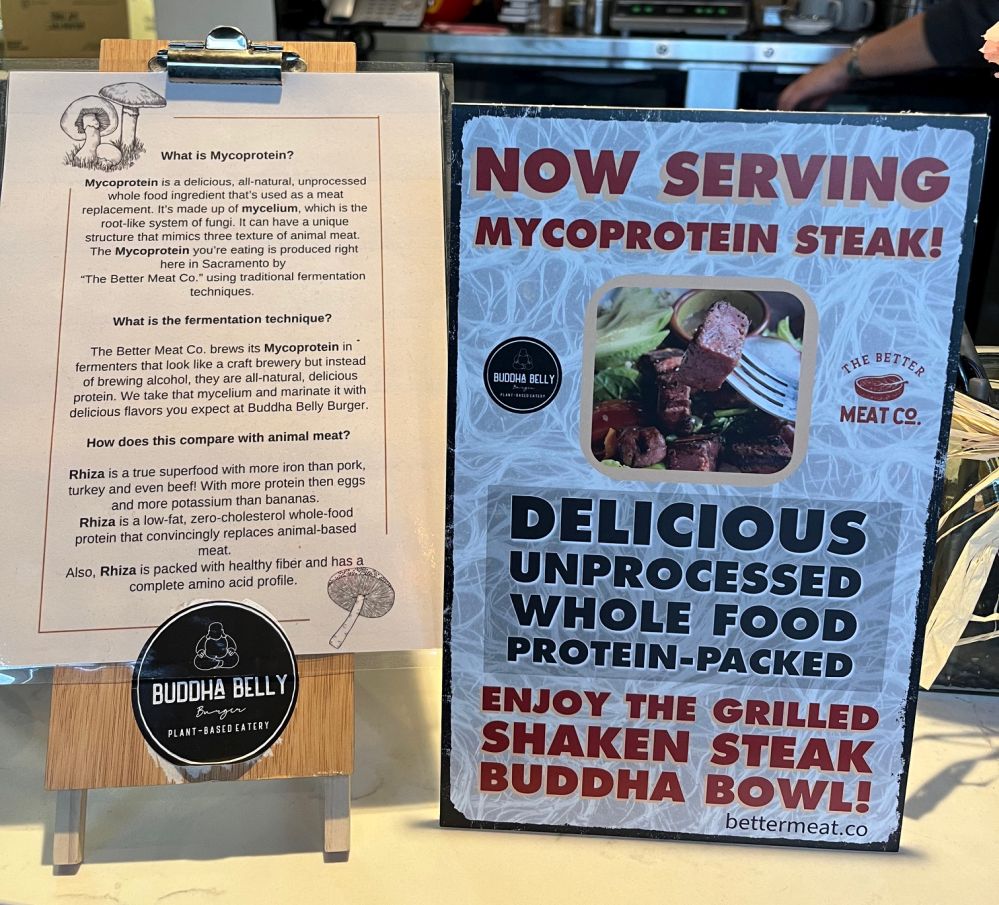
45-50% protein by dry weight, PDCAAS 0.87-0.96
According to a GRAS (Generally Recognized as Safe) notice from the company filed with the FDA in late 2022, Rhiza mycoprotein contains 45-50% crude protein by dry weight with a protein digestibility (PDCAAS) score of 0.87-0.96, which is close to animal proteins such as casein and egg.
At harvest, the fermentation cell slurry is dewatered to a moist cake format, then diced to a particle size of 5 – 50 mm. The mycelium dices are then dehydrated under controlled conditions to create a product that can be shipped at ambient temperatures and rehydrated at customers’ facilities, said Shapiro.
The Better Meat Co’s Neurospora strains have been successfully tested on multiple feedstocks from brewers’ spent grains to potato peelings, it is “not wedded to any of those,” said Shapiro. “It’s definitely simpler to use DE 95 and so while we have successfully run a variety of feedstocks, it will be a case of going down the path of least resistance when it comes to scaling up.”
Biomass fermentation
The Better Meat Co is one of a flurry of players in the so-called ‘biomass fermentation’ space, whereby microbes grown in sugary water in large steel bioreactors are the end product, in contrast to precision fermentation, where microbes are used as tiny factories that produce high-value ingredients such as enzymes.
Other companies growing fungi via biomass fermentation include industry pioneer Quorn; ENOUGH Foods in the Netherlands; Enifer in Finland; Infinite Roots and Nosh.bio in Germany; Nature’s Fynd and Meati Foods in the US; MycoTechnology in Oman; MycoSure in South Africa; and Maia Farms in Canada. These are complemented by players such as MyForest and Mush Foods, which are growing fungi via solid-state fermentation on trays without bioreactors.
Some of the above are focused on meat alternatives, while others are spreading their bets by targeting a broader range of application areas from cheese, yogurts and baked goods to pet food.



